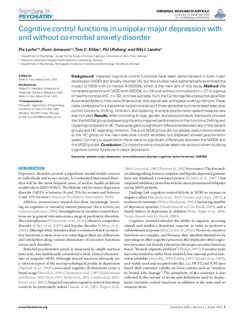| dc.contributor.author | Lyche, Pia Elisabeth | |
| dc.contributor.author | Jonassen, Rune | |
| dc.contributor.author | Stiles, Tore C | |
| dc.contributor.author | Ulleberg, Pål | |
| dc.contributor.author | Landrø, Nils Inge | |
| dc.date.accessioned | 2015-09-29T11:35:57Z | |
| dc.date.accessioned | 2015-10-22T13:27:05Z | |
| dc.date.available | 2015-09-29T11:35:57Z | |
| dc.date.available | 2015-10-22T13:27:05Z | |
| dc.date.issued | 2010 | |
| dc.identifier.citation | Frontiers in Psychiatry 2010, 1:1-9 | nb_NO |
| dc.identifier.issn | 1664-0640 | |
| dc.identifier.uri | http://hdl.handle.net/11250/2357768 | |
| dc.description.abstract | Background: Impaired cognitive control functions have been demonstrated in both major
depression (MDD) and anxiety disorder (A), but few studies have systematically examined the
impact of MDD with co-morbid A (MDDA), which is the main aim of this study. Method: We
compared patients with MDD with (MDDA; n = 24) and without co-morbid A (n = 37) to a group
of healthy controls (HC; n = 92) on three subtests from the Cambridge Neuropsychological Test
Automated Battery; intra–extra dimensional, stop signal task, and spatial working memory. These
tasks correspond to a theoretical model consisting of three separable but interrelated executive
control functions: Shifting, Inhibition, and Updating. A simple psychomotor speed measure was
also included. Results: After controlling for age, gender, and education level, the results showed
that the MDDA group displayed significantly impaired performance on the functions Shifting and
Updating compared to HC. There emerged no significant differences between any of the patient
groups and HC regarding Inhibition. The pure MDD group did not display dysfunctions relative
to the HC group on the main executive control variables, but displayed slowed psychomotor
speed. Contrary to expectation there were no significant differences between the MDDA and
the MDD groups. Conclusion: Co-morbid anxiety should be taken into account when studying
cognitive control functions in major depression. | nb_NO |
| dc.language.iso | eng | nb_NO |
| dc.publisher | Frontiers | nb_NO |
| dc.title | Cognitive control functions in unipolar major deepression with or without co-morbid anxiety disorder | nb_NO |
| dc.type | Journal article | nb_NO |
| dc.type | Peer reviewed | en_GB |
| dc.date.updated | 2015-09-29T11:35:57Z | |
| dc.source.volume | 1 | nb_NO |
| dc.source.journal | Frontiers in Psychiatry | nb_NO |
| dc.identifier.doi | 10.3389/fpsyt.2010.00149 | |
| dc.identifier.cristin | 524541 | |
| dc.description.localcode | © 2010 Lyche, Jonassen, Stiles, Ulleberg and Landrø. This is an open-access article subject to an exclusive license agreement between the authors and the Frontiers Research Foundation, which permits unrestricted use, distribution, and reproduction in any medium, provided the original authors and source are credited. | nb_NO |
